ICYMI, U.S. Senator Lisa Murkowski (R-AK), Vice Chairman of the U.S. Senate Committee on Indian Affairs, attended and spoke at a ceremony in Kake, Alaska, where the U.S. Navy formally apologized for bombarding the Alaska Native village of Kake, Alaska in 1869.
Senator Murkowski has advocated for this formal apology for many years. She has heard directly from the leadership of the respective villages and clans about the pain and suffering that was inflicted on the Tlingit people by this bombardment and how, generations later, it continues to affect the community. This formal apology is long overdue but marks the start of healing for the community.
“It was incredible to be present at this ceremony to witness the United States military’s historic apology for the devastating 1869 bombardment of Kake. I have heard for many years how the people of Kake have not been able to heal from the trauma of the Navy’s attack. Families have shared the stories of the destruction, which led to deaths among children and elders. These families have had to live with that sadness and unresolved trauma for too long,” said Senator Murkowski. “One of the cultural values the people of Kake carry is spiritual and cultural balance. When trying to find that balance, apologies need to be made, to say ‘I am sorry, we failed you.’ While far overdue, it is appropriate now that our military offered this apology to the people of Kake for their loss. I commend the clan leaders in Kake for their humble acceptance of the Navy’s apology, and hope that this acknowledgment will promote healing from the intergenerational trauma caused by the United States government’s mistakes. It was my great honor to have worked alongside the community of Kake to advocate for this historic event.”
Senator Murkowski was previously adopted into the Deisheetaan clan by the late Selena Everson. During the ceremony, Senator Murkowski delivered remarks with fellow Deisheetaan clan members at her side, after inviting them to join her at the podium. Senator Murkowski delivered her remarks wrapped in a peace blanket lent to her by Joe Zuboff via Sealaska Heritage Institute’s President, Dr. Rosita Worl.
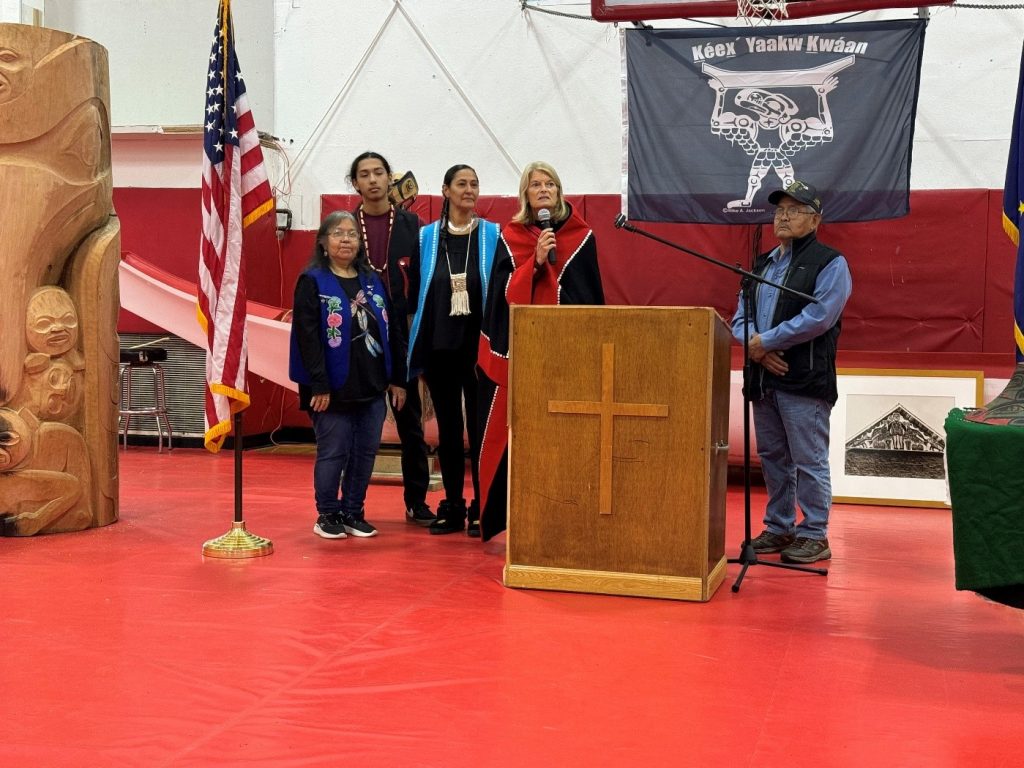
Senator Murkowski delivers remarks at the formal apology.
For video of Senator Murkowski’s full remarks, click here.
Excerpts from Senator Murkowski’s remarks
- “This is an historic moment. This is a moment in time, as we have heard, that has been coming for generations.”
- “I was reminded by Liz Medicine Crow that the children in the schools here are the 7th generation to hear, understand, and grieve what happened with the bombardment of 1869. Seven generations of loss.”
- “I was gifted the name Aan shaawátk’I. which means Lady of the Land. It is a tribute and an honor that I care and I carry so deeply with me. It is a responsibility that I have to not only the Deisheetaan, but to all of Alaska’s peoples.”
- “The blanket I wear at this moment that Dr. Worl has honored me with wearing for this time is a peace blanket.”
- “I became involved in these discussions – I heard about this story – years ago. Years ago, I’d learned there had been an effort for an apology, which had to work its way up not only through the military leadership, but then needed to be signed off by the Secretary of the Navy and by the President. And that it made it’s way so far up in the Clinton Administration, but was ultimately rejected. That was before I had heard of these stories, but this effort is one that should not die, that could not die, that must be remedied.”
- “I want to acknowledge Dr. Worl for not only convening so many, but [also for her] very, very direct reach out to our military leadership. It was in 2019 that she reintroduced the story to General Tom Bussiere who was head of the Alaska Command at the time. And General Bussiere said this wrong must be righted. I will work with you. But as happens, Generals come and they go. And General Bussiere worked hard but it was not accomplished.”
- “I was asked in my role as a member of the Senate Indian Affairs Committee for help from the U.S. Navy on an issue thousands of miles from here, in Nevada, where they were looking to convey property to allow for an extension of a military facility. They said what they were going to do was ensure that the Native people who had been harmed by the military’s actions would receive recognition and would receive a level, a show of apology. And I said ‘I will work with you on that issue in Nevada, but you must understand that the people of Kake have a raw and an open scar that has been left for generations. That the people of Angoon have a raw and open scare that has been left for generations. And the people of Wrangell. So, help us to ensure that these wrongs are corrected.”
- “It was humbling to be in Juneau in celebration this year. To be part of the lengthy discussions with our military liaisons, some of whom are in this room this afternoon. And our Native leaders and elders from Kake, from Angoon, and from Wrangell, and to finally be to that point where the answer is ‘yes, an apology is necessary. Let’s talk about when.’ And now that ‘when’ is here for the people of Kake. And, so, to be able to announce at Celebration was a truly humbling moment.”
- “It is my hope that we can move together, forward, with respect and understanding for each other’s cultures, for each other’s world views, and that with these words of apology, respect is finally afforded to the people of Kake.”
Ceremony Highlights
The ceremony was overseen by Joel Jackson, the president of the Organized Village of Kake, who spoke to the Navy’s historic injustice and the need for an apology for the community to truly heal.
“This has been 155 years in the making,” said President Jackson. “We know we lost people that day. And it’s becoming real. Becoming real, because we never talked about it. And now we are.”
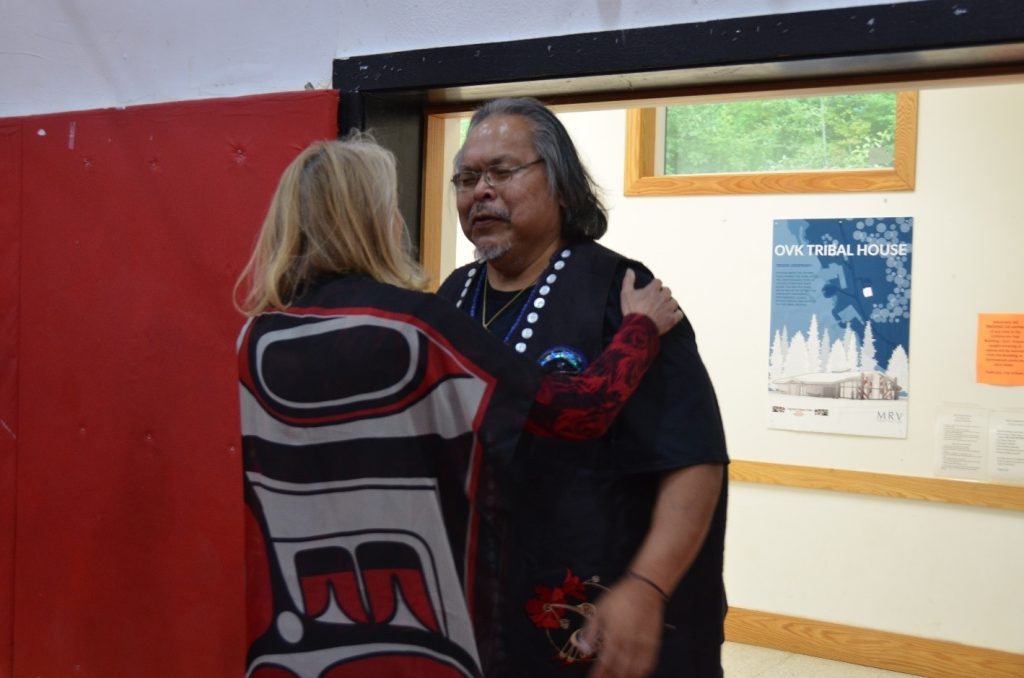
Senator Murkowski greets Joel Jackson at the formal Navy apology.
At the ceremony, the community of Kake displayed a number of historical and traditional items – including tools, art, a hand carved canoe, and regalia – to help impress upon others the significance of what was truly lost, in addition to human lives, due to the Navy’s attack. Mike Jackson, Transportation Director, Historian, and Chief Judge for the OVK Tribal Court explained that this loss included totem poles. He introduced Robert Mills, a Tlingit artist and a lifelong resident of Southeast, Alaska, who calls the village of Kake his home, presented one portion of a three-segment totem pole which serves as a vignette of the Naval attacks in Kake, Wrangell, and Angoon.
“The next iteration of Raven will be ascending above all this. And he’s going to be bringing up people – culture bearers, language speakers, artists – because the truth is we’re champions. And this doesn’t define us. And we are ascending it all, and our culture is leading the way,” said Mills. “Time and time again for thousands of years, we’ve championed many difficulties and hardships, and this is no different. We are not victims, we are champions and our focus is where we’re going and where we’re going to continue to grow and prosper.
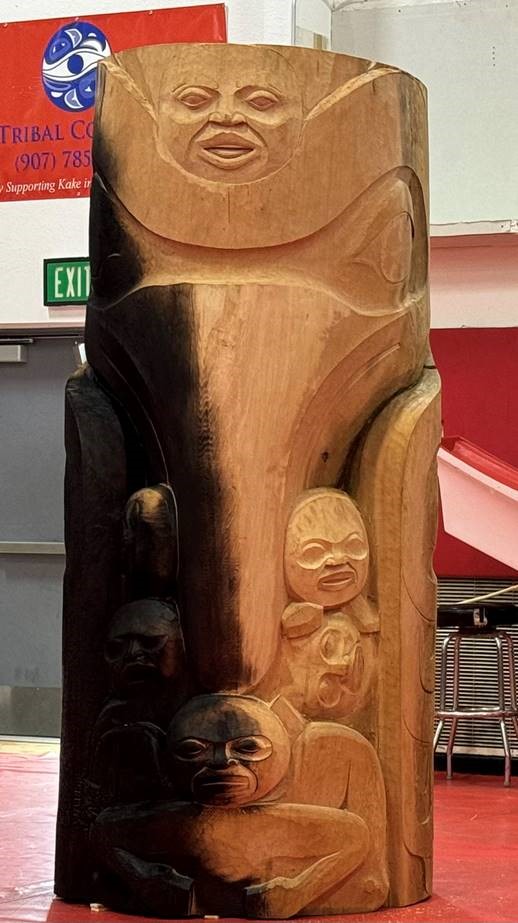
The bottom segment of a three-part totem pole, carved by Tlingit artist, Robert Mills. This portion represents the Raven and the First Peoples. The black burned portion represents the direct loss of life due to the bombardment. The totem pole was commissioned by the Anchorage Museum.
The Navy’s formal apology was presented by Rear Admiral Mark B. Sucato.
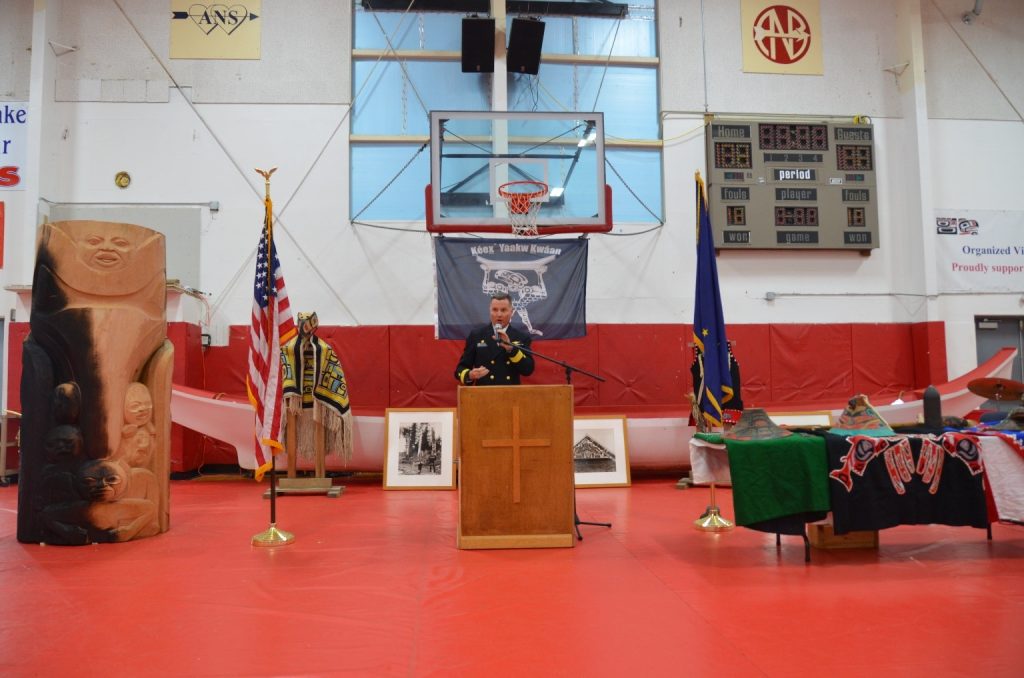
Rear Admiral Mark B. Sucato delivers formal apology from the U.S. Navy to the community of Kake.
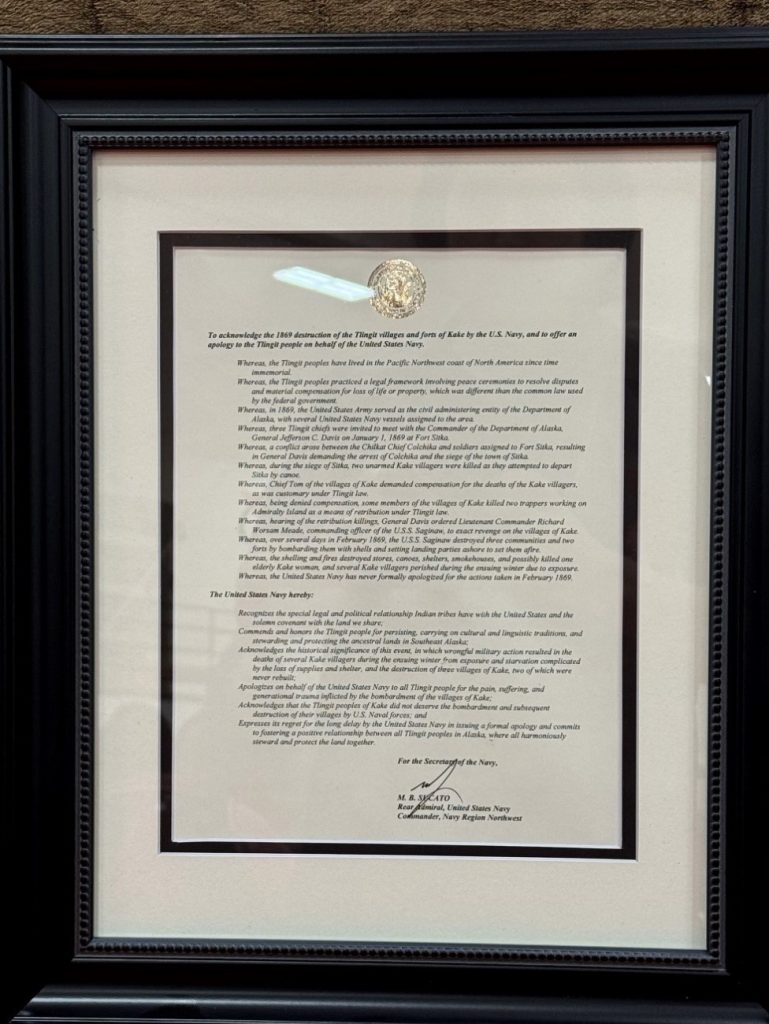
The U.S. Navy’s formal apology to Kake.
Following the Navy’s apology, Dr. Ruth Demmert stood to accept the U.S. Navy’s apology.
“All of our five houses, we accept this apology,” said Dr. Ruth Demmert. “We as Kaach.ádi accept this apology, which is long overdue. Our ancestors went through lots to keep this whole thing going. We are still here as the generations. And for the future generations, this place will always be home. Gunalchéesh, United States Navy for your late apology.”
Following Dr. Demmert’s speech, representatives of many other clans stood to accept the Navy’s apology and offer their reflections. President Jackson, on behalf of the Organized Village of Kake, also accepted the Navy’s apology.
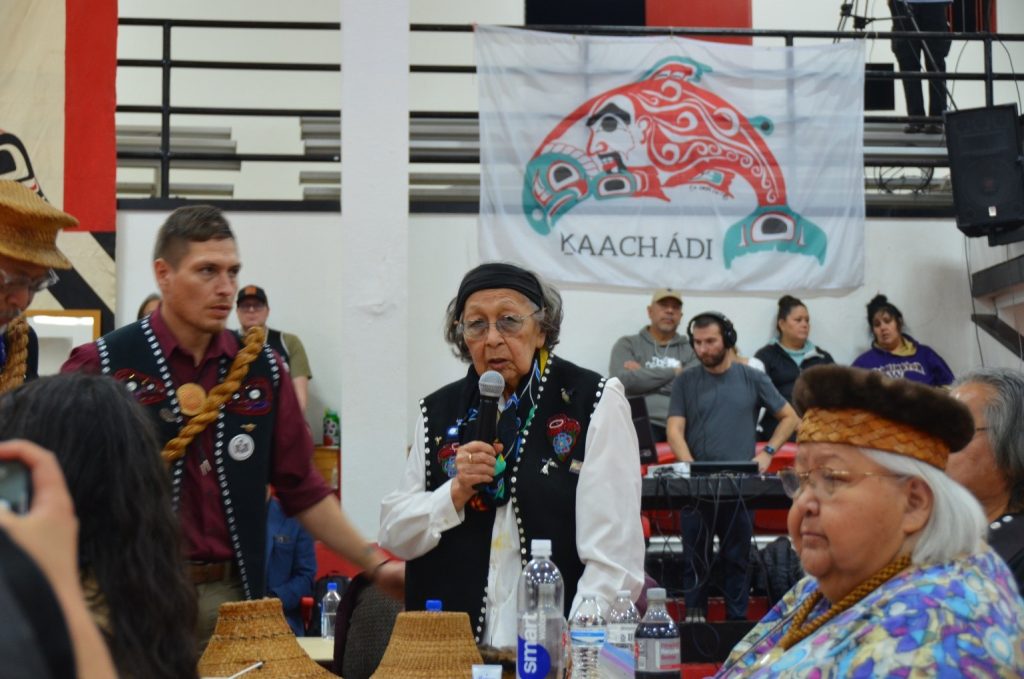
Dr. Demmert stands to accept the U.S. Navy’s apology to Kake.
Video of Dr. Demmert’s full acceptance of the apology can be found here.
The communities of Angoon and Wrangell have also sought apologies for many years from the military for the destruction of their villages that occurred in 1882 and 1869. The Navy is scheduled to deliver a formal apology to the community of Angoon on October 26, 2024, the 142nd anniversary of the 1882 bombardment.
The full ceremony can be viewed in a recording by Sealaska Heritage Institute here.
###
